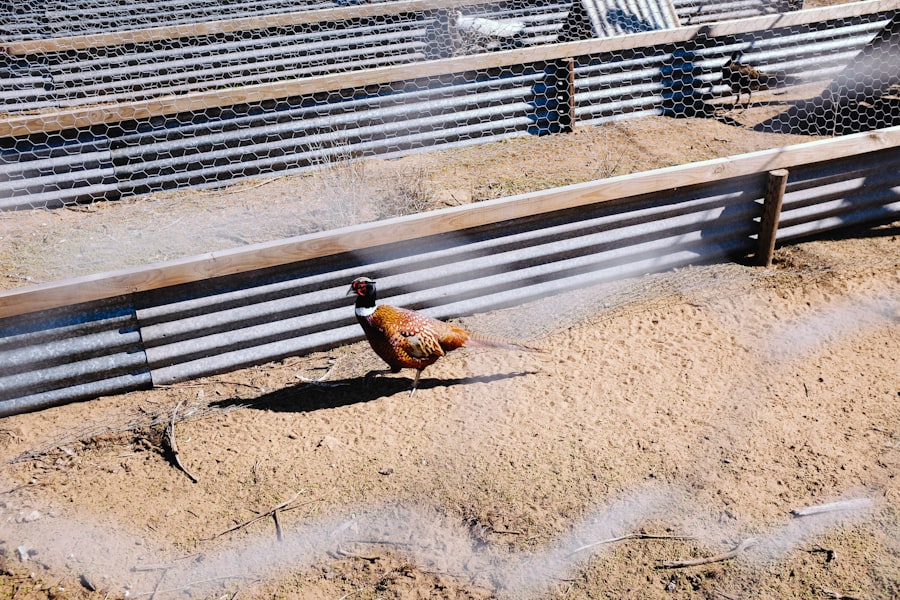Free range chickens exhibit natural foraging and roaming behaviors, driven by their curiosity and active nature. These social animals follow a hierarchical structure within their flock, which influences their movement patterns and attraction to specific areas. Chickens are particularly drawn to freshly turned soil, as it often contains insects and other food sources.
They tend to revisit locations where they have previously found food or shelter, establishing habitual patterns. Scratching and dust bathing are essential behaviors for free range chickens. Scratching helps them uncover insects and seeds, while dust bathing maintains feather health and removes parasites.
However, these activities can potentially damage garden beds and disturb plants. Chickens also show a preference for certain plant types, such as leafy greens and berries, which may lead to unwanted consumption of garden produce. Understanding these behavioral traits is crucial for effective management of free range chickens around gardens.
By recognizing their instincts and preferences, gardeners can implement appropriate strategies to protect their plants while still allowing chickens to roam freely in designated areas. This knowledge enables a balanced approach to maintaining both a productive garden and healthy, free range chickens.
Table of Contents
- 1 Implementing physical barriers to keep chickens out of the garden
- 2 Using natural deterrents to discourage chickens from entering the garden
- 3 Providing alternative areas for chickens to forage and roam
- 4 Training chickens to stay out of the garden
- 5 Utilizing scare tactics to keep chickens away from the garden
- 6 Establishing a routine for monitoring and managing chicken activity around the garden
- 7 FAQs
- 7.1 What are some effective methods for keeping free range chickens out of the garden?
- 7.2 Are there any plants that can help deter free range chickens from entering the garden?
- 7.3 What are some potential drawbacks of keeping free range chickens out of the garden?
- 7.4 How can I train my free range chickens to stay out of the garden?
- 7.5 Are there any legal considerations to keep in mind when trying to keep free range chickens out of the garden?
Key Takeaways
- Free range chickens are naturally curious and will explore their surroundings, including gardens
- Physical barriers such as fences and netting can effectively keep chickens out of the garden
- Natural deterrents like citrus peels, coffee grounds, and vinegar can discourage chickens from entering the garden
- Providing alternative foraging areas and enrichment activities can redirect chickens’ attention away from the garden
- Training chickens with positive reinforcement and consistent cues can help them learn to stay out of the garden
- Scare tactics like motion-activated sprinklers or noise-making devices can startle chickens and deter them from entering the garden
- Regular monitoring and proactive management of chicken behavior is essential for maintaining a chicken-free garden
Implementing physical barriers to keep chickens out of the garden
Fencing: A Sturdy Deterrent
Installing fencing around the perimeter of the garden is an excellent way to prevent chickens from gaining access. The type of fencing used should be sturdy and tall enough to deter chickens from flying or hopping over it. Additionally, it’s essential to bury the bottom of the fence underground to prevent chickens from digging underneath it.
Protecting Individual Plants
Another option is to use chicken wire or netting to cover individual garden beds or plants that are particularly vulnerable to chicken damage. This can help protect delicate seedlings and young plants from being trampled or scratched up by curious chickens.
Raised Beds and Cloches: Additional Barriers
In addition to fencing, gardeners can also use other physical barriers such as raised beds or cloches to protect their plants from chicken activity. Raised beds elevate plants off the ground, making them less accessible to scratching and pecking chickens. Cloches are protective covers that can be placed over individual plants to shield them from chicken damage.
By implementing these physical barriers, gardeners can protect their plants and maintain a harmonious coexistence with their free-range chickens.
Using natural deterrents to discourage chickens from entering the garden
In addition to physical barriers, natural deterrents can also be used to discourage free range chickens from entering the garden. One effective natural deterrent is the use of strong-smelling herbs and plants that chickens find unappealing. For example, planting aromatic herbs such as lavender, rosemary, or mint around the perimeter of the garden can help deter chickens from entering.
These strong scents can mask the smell of tempting plants and make the area less attractive to chickens. Additionally, scattering citrus peels or coffee grounds around the garden can also help repel chickens, as they dislike the smell of these substances. Another natural deterrent is the use of motion-activated sprinklers or noise-making devices that startle chickens when they approach the garden.
These devices can help create a negative association with the garden area, causing chickens to avoid it in the future. Additionally, hanging shiny objects such as aluminum foil strips or old CDs around the garden can create visual disturbances that deter chickens from entering. These natural deterrents can be effective in discouraging free range chickens from accessing the garden while still allowing them to roam freely in other areas of the yard.
Providing alternative areas for chickens to forage and roam
To prevent free range chickens from entering the garden, it’s important to provide alternative areas for them to forage and roam. This can include designating a specific area of the yard for chickens to explore, such as a fenced-in chicken run or a designated free range area. By providing a dedicated space for chickens, gardeners can encourage them to stay out of the garden while still allowing them the freedom to roam and forage.
Additionally, creating a chicken-friendly environment with plenty of vegetation, insects, and dust bathing areas can help keep chickens occupied and less inclined to venture into the garden. Another option is to provide supplemental feed for chickens in their designated area to reduce their reliance on foraging in the garden. This can include offering a balanced diet of grains, seeds, and kitchen scraps to ensure that chickens have access to nutritious food without needing to enter the garden.
By providing alternative areas for chickens to forage and roam, gardeners can help minimize their impact on the garden while still allowing them to exhibit natural behaviors.
Training chickens to stay out of the garden
Training free range chickens to stay out of the garden can be a proactive approach to managing their behavior. Chickens are intelligent animals that can be trained through positive reinforcement techniques. One method is to use treats as a reward for staying out of the garden.
By offering treats in their designated area and withholding them when they approach the garden, chickens can learn to associate staying out of the garden with receiving rewards. This positive reinforcement can help encourage desirable behavior and discourage chickens from entering the garden. Another training method is to use verbal commands and gentle redirection to guide chickens away from the garden.
By consistently using a specific command or sound when chickens approach the garden, they can learn to associate it with being redirected back to their designated area. Over time, this consistent training can help reinforce boundaries and encourage chickens to stay out of the garden. By training chickens to stay out of the garden, gardeners can establish clear expectations for their behavior while still allowing them the freedom to roam and forage in other areas.
Utilizing scare tactics to keep chickens away from the garden

Predator Decoys and Silhouettes
One effective way to keep free-range chickens away from the garden is to use scare tactics. A common method is to employ predator decoys or silhouettes that mimic natural predators such as hawks or owls. By placing these decoys around the perimeter of the garden, you can create a sense of danger for the chickens, causing them to avoid the area altogether.
Motion-Activated Deterrents
Additionally, you can use motion-activated noise-making devices or sudden bursts of water to startle the chickens and create a negative association with the garden. These sudden and unexpected disturbances can be an effective way to deter chickens from entering the garden.
Visual Deterrents
Another scare tactic is to use visual disturbances such as scarecrows or brightly colored flags that move in the wind. These visual deterrents can create a sense of unease for the chickens and discourage them from entering the garden.
By utilizing these scare tactics, gardeners can effectively deter free-range chickens from accessing the garden while still allowing them the freedom to roam and forage in other areas.
Establishing a routine for monitoring and managing chicken activity around the garden
Establishing a routine for monitoring and managing chicken activity around the garden is essential for maintaining a harmonious coexistence with free range chickens. This can include regularly inspecting physical barriers such as fencing or netting for any signs of damage or wear that may need repair or reinforcement. Additionally, monitoring chicken behavior and activity around the garden can help identify any areas where they may be gaining access or causing damage.
Another important aspect of routine management is providing regular maintenance and enrichment in designated chicken areas. This can include regularly replenishing food and water supplies, as well as providing opportunities for dust bathing and foraging. By maintaining a clean and stimulating environment for chickens, they are less likely to seek out alternative sources of food or entertainment in the garden.
In conclusion, understanding free range chicken behavior is crucial in effectively managing their presence around the garden. By implementing physical barriers, natural deterrents, and providing alternative areas for chickens to forage and roam, gardeners can minimize their impact on the garden while still allowing them the freedom to exhibit natural behaviors. Training chickens and utilizing scare tactics can further reinforce boundaries and discourage them from entering the garden.
Establishing a routine for monitoring and managing chicken activity around the garden is essential for maintaining a harmonious coexistence with free range chickens while protecting valuable plants and crops.
If you’re looking for tips on how to keep free range chickens out of your garden, you might want to check out this article on poultrywizard.com. It offers advice on how to build a chicken coop that will keep your chickens contained and away from your garden.
FAQs
What are some effective methods for keeping free range chickens out of the garden?
Some effective methods for keeping free range chickens out of the garden include using physical barriers such as fences or chicken wire, using natural deterrents like citrus peels or coffee grounds, and providing alternative areas for the chickens to forage.
Are there any plants that can help deter free range chickens from entering the garden?
Yes, there are some plants that can help deter free range chickens from entering the garden. These include plants with strong scents such as lavender, mint, or rosemary, as well as plants with prickly or spiky leaves like holly or barberry.
What are some potential drawbacks of keeping free range chickens out of the garden?
Some potential drawbacks of keeping free range chickens out of the garden include the need to maintain and repair physical barriers, the potential for the chickens to become stressed or bored without access to the garden, and the possibility of creating a less natural environment for the chickens.
How can I train my free range chickens to stay out of the garden?
You can train your free range chickens to stay out of the garden by using positive reinforcement, such as providing treats or praise when they stay away from the garden, and by consistently redirecting them to alternative foraging areas.
Are there any legal considerations to keep in mind when trying to keep free range chickens out of the garden?
Yes, there may be legal considerations to keep in mind when trying to keep free range chickens out of the garden, such as local ordinances regarding the keeping of chickens and the use of physical barriers or deterrents. It’s important to check with local authorities to ensure compliance with any relevant regulations.
Meet Walter, the feathered-friend fanatic of Florida! Nestled in the sunshine state, Walter struts through life with his feathered companions, clucking his way to happiness. With a coop that’s fancier than a five-star hotel, he’s the Don Juan of the chicken world. When he’s not teaching his hens to do the cha-cha, you’ll find him in a heated debate with his prized rooster, Sir Clucks-a-Lot. Walter’s poultry passion is no yolk; he’s the sunny-side-up guy you never knew you needed in your flock of friends!







